Chip ‘n Dale
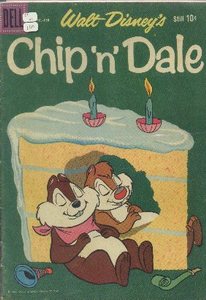 |
What limb is my brain out on now? And if I rub myself against the tree trunk, like they say the old philosopher did, will my own thoughts drop down and bonk me on the head? A fresh thought can hit me harder than a falling anvil; you have no idea. And the next thing you know, I’ll be hearing animals talk, though I would never bark at them; I’d just give them a pet. It is so lovely, the things animals say to one another, not that do-littles like me understand.
Just take Chip ‘n Dale, those sweet little California chipmunks in the old Mickey Mouse comics. The ones from the fifties, you know—can you even find those anymore? Chip ‘n Dale loved one another so much, they could come together anytime. Always there for each other, over hull and down dale, even if things never got that deep. And gosh, what a pair! The rare kind where gender parity is just assumed. (This is Chip ‘n Dale we’re talking about, you know, not Chippendales.) They each have their own gender, their own chipmunk parts too, but each can always use the other’s for fun and nothing changes if they do. Theirs is the only hole in town—the sole tree to bark up, too—and so they use what they have, modest little souls. They each know what they’ve got, and they know it’s a lot, and no outsider is gonna take it from them. Only let’s say they wanted something exotic for a change: would they have to charm one another first, the way snakes do? No! Each of them plays all the parts in the moving picture of their lives, which, even in the silent parts, is never dumb. They are actually quite talky for animals: they chitter and they chatter; it’s their love language. A veritable river of chit-chat comes pouring out, two living beings in one, two sexes, too, each happy just being there.
Such a pair of sweethearts, those two. And from the time I first saw them, when I was a kid, no other vision of love would do. Chip ‘n Dale never have to sell one another on their loyalty, they redeem it every second, no proof of purchase required. The mere fact of loving is enough for them; it is their redemption, their whole raison d’pet. They say it with their bodies, though not with heavy petting; they just complete one another, two in one, and all without doing a single thing, either to each other’s bodies or to anything. Their love is both this and that, never all or nothing; when it comes to love, Chip ‘n Dale are all-in. All-in-one, that is, and one-in-all: a tough nut to crack, identity-wise, not that love has turned them into clones. Or drones. Or fools.
Chip ‘n Dale are two different chipmunks, anyone can see that, though are they doubles, too? Do their bodies mirror each other so closely that they don’t need bodies at all? Nuts to that! They are bodies, just not the kind you can define by what a mirror sees. Two kind little animals, each always knowing what the other will say or do—and vice versa, too! Always finishing each other’s sentences, or yodeling down a wishing well, say, but what if the song they are singing is super short and Chipmunk One misses the cue? Well, One can still come in late, after Two has sung it through, in a belated show of love, bluff but never tough, an echo (“hoo hoo hoo…”). And wouldn’t it be a shame if these two friends just disappeared one day? They’re something else, Chip ‘n Dale, so full of savoir fur. They are over our heads. We who long to be slim, savvy little whizzes at life, the type that belong in glossy magazines or on TV. Screens are the very best of us, our technological apogee, the place we show the other humans what all we can be. Who we really are—or what—and what we’re like on the inside, maybe in a Pornhub clip or on reality TV. A human being is a human doing, after all, and with life whizzing past so quickly, how do we know what we are if nobody sees? Because when we make it onscreen, in high-def 4G, our bodies are fashioned into something so hopelessly smart, we don’t even know them anymore. So, word to the wise: if you wanna be loved, you better be somebody, even if your fifteen minutes are also your undoing and only make your friends hate you more. Gee whiz.
None of this applies to Chip ‘n Dale, though; they don’t have to be anybody or anything. No runway-ready fashions or twee accessories for them, their love is a wish-free zone. And if one does make a wish, the other has wished it already, or else wants the same thing right away. Two might even say “I wish” before One gets to, in a kind of reverse echo—so close, your ear’ll go: who? It is eerie, this sound, one of those upside-down moments in life where two things that are unrelated seem inseparable somehow. Like how, when you are facing the end of the world, it is the thought of going extinct, not extinction itself, that makes everything so strange and far away. The end always looms—it’s what ends do and our world has been on the way out for decades, now more so than ever.
There is a basic loyalty in Chip ‘n Dale, the kind of good faith we all want in the end. They even share nuts, it’s second nature to them: come one, come all. Come to think of it, these two chipmunks are almost as one as God, and he needed three people! They are not some pair of squirrely monks, though, or people at all, even if they are personable. Chip ‘n Dale are animals, and their love is a chatter song, one without rests or intermissions. And because they stay so tuned—no, attuned!—to each other, their lovingkindness never hits a sour note or flubs the melody. One of them must be a girl, I think, and the other a boy, though don’t ask me which is which. Easy assumptions about nature are for fools anyway, so if you make them, don’t rush in! They only make an ass of u and me, and to see Chip ‘n Dale in a way that isn’t ass-backwards, better get out your rodent anatomy guides! Observe their primary and secondary sex characteristics: how one is bigger, for instance, with a giant red nose, though who knows which one that is. Humans, when we are feeling sentimental, treat animals less as part of nature than as objects with some mysterious treasure inside. And this special something, this je nut sais quoi, is my subject here: a thing nobody can hoard or hawk, that animals just have extra of, no matter how much we humans prey on nature and make it suffer. It is a treat, though not for our sorry species, an entreaty, a soft prayer, world without end. So endeth Elfriede’s Treatise on Nature: treateth it with a grain of thalt!
Unlike most couples, Chip ‘n Dale agree on everything, every single what, where and who. Why, you could change the course of a major river faster than you could split up these two—thufferin thuccotash! They run their own course but don’t get lost, except in each other, they might get lost there a while. Without ever losing themselves, though, even when their boundaries break down and you can’t tell where one ends and the other begins. The story of Chip ‘n Dale is a joint account, one long, lazy river of liquidity that never breaks the banks. It is not that they’re “down to earth,” exactly: they live in a tree, for heaven’s sake! And with their holdings all heaped up around them, the place is a real nuthouse. Still, property, real or personal, does not interest them, because let’s say they leased some little plot of land, a paradise where they could finally be themselves: how long would it be before someone came and put up a parking lot? Chip ‘n Dale are no Scrooges, they would rather be unbanked: their big interest is holding onto one another.
Which, I think, is the essence of love: that nothing happens. Love is plotless, even though deadly, dire events can happen anytime. Love happens when nothing happens; it is just there—that way, it’s there when you need it. Like the time Chip ‘n Dale decided to go Christmas caroling: naturally they wanted to sing together, they are like twins, after all, each holding the key to the other’s heart. And so, they try their yodeling act again, only this time, tragically, in front of Uncle Donald’s house. Their singing, let’s just say, isn't much of a treat: they are off key and can’t seem to stay together. Donald is no crooner himself, but he does know what he doesn't like, and since no one ever listens to him—his nephews learned the hard way how that ends—his hearing is tip top. So Chip ‘n Dale sing their songs and mean old Donald leaves them out in the cold, at the mercy of their own animal nakedness. Sort of like us, standing Adam-naked before technology ever since we ate from its apple tree. For Donald and his generation, technology was merciful, the thing that would save us, only now we are beyond saving, even from ourselves. We are in sleep mode, powerless to auto-correct or even think, much less complete anyone else’s thought. Because how can we predict what one person will think if another didn’t think it first? We are at technology’s mercy, trapped in our own artificial intelligences. The way we think now is calculating, although it’s really just one plus one and we cannot picture the underlying code. Thought can’t even picture itself, you know, and as long as we live in the shadow of our own thinking, we will never see the world as it is, with the predictability numbers bring. We fancy ourselves the saviors and servants of nature, but then, when it’s crunch time and the bomb is about to drop, we cannot crack the code. Nature is a shadow of itself now, anyway: all our crackpot, fancy number-crunching schemes have, predictably, destroyed it.
And there, in the fallout, way out on their limb, sit Chip ‘n Dale. Still at one with nature, even now, when Earth is becoming our personal hotspot and technology is the second coming of Man. They come as they are, quietly; and if I stop to think about it—not that I ever stop thinking—how can anyone stay so well-grounded hanging from a tree? Their sentences skittering along, claws after claws; the words at one another’s heels, without any paws. So consider the chipmunk, thou tree-hugger: how they stay chill and will work for peanuts, no supervision or fines required! Whatever nuts Chip ‘n Dale need are squirreled away in their treehouse; the harvest was plentiful and the workers were two. Now all they have to do is to hold tight, to one another’s limbs, as they climb the treetops of their own imaginations, all nut-brown and supercharged with love, and above them only sky. It isn’t some new self-image or caché they are after up there, so much as a vision of life they can cash in on together. They’re real cool customers, this pair—so cool, their cache of nuts isn’t even refrigerated: how’s that for low-tech! And they do everything together, come what may, each leaving the door to their worlds wide open; they are the world to each other. They come and go freely, day in, day out. Each knowing the way; they are the doorway. Which definitely sets them apart from us: before we’ll let anyone into our weird little worlds, we need ground rules and safe words—that way, we can always show them the door if things get too real. Do you think Chip ‘n Dale might even be brother and sister? Could be; no clue. They obviously feel safe with each other: look at the love they share. They have nothing to prove and no chipmunk-proof safe—the nuts belong to them both! They don’t have to serve one another either; they are service, in the flesh. And probably you nay-sayers out there will call that co-dependence, but it is not, because when you are like Chip ‘n Dale, living just for today, words like “depend” don’t even make sense. Je naysay what?? Their safe space is a hole in a tree, where togetherness is all there is. Imagine that! A world where all can be as one, no possessions to serve or boundaries to observe. No religion, too.
Chip ‘n Dale are yea and nay all at once, the way a God-botherer’s speech ought to be. They live by a non-binary code, 1s and 0s all at once, totally unbothered about technology or any other service we end up serving instead. Two cartoon chipmunks can’t really relate to screens; they relate best to one another. Their relationship is a one-server peer-to-peer nutwork that serves no one but them. They don’t even have to connect to the natural world they live in since somehow, they are both animals and not. There is nothing for them to live-tweet and nothing to process, least of all in themselves. And because Chip ‘n Dale have zero links to nature—or even to each other; they just live live live—everything we connect to seems pointless to them, which only makes the point of our lives murkier. We who see through a screen darkly, praying always not to see the blue screen of death.
If you are human, and alone, you are forever at the mercy of something—even the atom bomb, that other force of nature that could blow sky high and bury us all in layers of forgetting. Not Chip ‘n Dale, though: they are the opposite of alone, bunkered down in their comfy lair like codebreakers, like togetherness itself. I honestly don't know how they do it. What’s their secret? Size-wise, the atom bomb is a pretty big secret; Chip ‘n Dale, not so much. Although really, how two lives become one is maybe the biggest secret of all, a great mystery. Don’t ask me how two chipmunks made themselves into a mystery—or at least, one to me. Although, if a mystery is something that eventually has to be revealed, does that mean they can’t be? Because just like the atom bomb scares us more by not exploding, the mystery of Chip ‘n Dale deepens when they never reveal it. I would recognize those sweet little creatures anywhere, by sight—which, funnily enough, means they’re not even here. And the fact that I saw them as a child means they could reappear any minute: how’s that for a mystery? "Ahörnchen und Behörnchen" Translation by Aaron Sayne
|
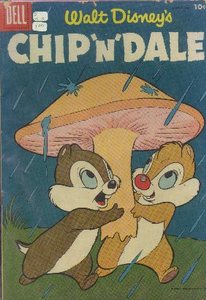 |
|
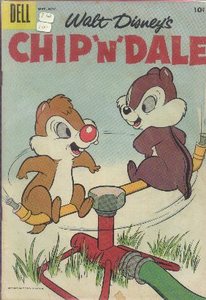 |
|
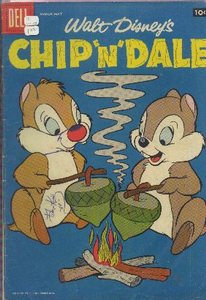 |
|
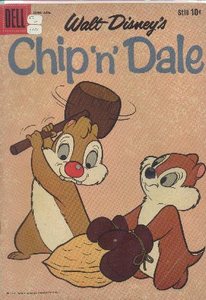 |
|
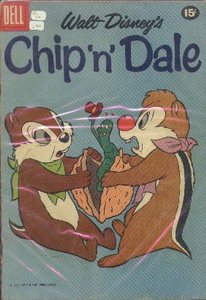 |
April 2004, "du"-Magazin, s 18/19, (du-745)
Bilder aus: http://www.towards2112.com/dellcomics/chipndale.html
8.2.2004 / 7.5.2022
Chip ‘n Dale © 2004 Elfriede Jelinek
zur Startseite von www.elfriedejelinek.com